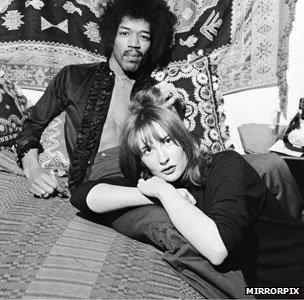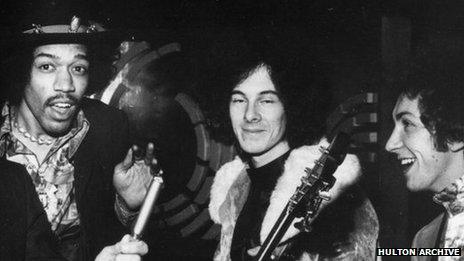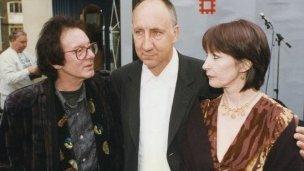Kathy Etchingham: Life as Jimi Hendrix's 'Foxy Lady'
- Published

As fans of guitar legend Jimi Hendrix anticipate the release of a new album featuring 12 previously unreleased studio tracks in March, his former girlfriend Kathy Etchingham recalls their relationship.
In September 1966, a DJ and hairdresser from Derby walked into the Scotch of St James nightclub in London.
"There were stairs winding down to the basement and everybody was leaning over the banisters to listen to this guy sitting in the corner of the club playing," remembers Etchingham, who was then just 20. "They were enthralled."
The lighting in the club was so low that she could barely see Jimi Hendrix, who was then just 24 and newly arrived from New York. His talent was obvious, but at this stage his new English manager, Chas Chandler, hadn't even found him a backing band.
When the set was over, Chandler introduced Etchingham to Hendrix. With his army jacket, Afro hair and flowery shirts, the black American was unlike any man she had ever met before.
"He just looked unusual - stunning really," she says. "He was fresh and he had a very soft sort of American accent."
Within minutes, Hendrix was whispering: "I think you're beautiful" in her ear. Etchingham acknowledges the line was corny, but she says that coming from a man like Hendrix, it worked.
Within hours, they were heading down Piccadilly towards Hendrix's hotel.
Hendrix, unused to London traffic, was nearly hit by a car when he looked the wrong way while crossing the road.
"He stepped out and a taxi just brushed across his chest," Etchingham says, "I dragged him by the back of his coat and pulled him back. You've got to look the other way, I told him."
Etchingham discovered that Hendrix was an "experienced and imaginative" lover who could make sex more romantic than she'd ever known it before.
But the next morning, the couple were interrupted at the hotel by another woman with designs on the young guitarist.
"She burst into the room at about 11 in the morning, screaming, swearing and calling him a bastard," Etchingham says. "She grabbed a guitar, lifted it by the neck and was poised to bring it down on our heads while we were in bed."
"I dived under the covers and half under Jimi, while he shouted 'put it down, put it down'."
The guitar was Hendrix's only instrument at the time, and he was desperate to stop it being smashed.
To the couple's relief, the woman eventually backed down, merely flouncing out with the guitar before disappearing in a blue Jaguar.
Hendrix eventually got his guitar back and started living with Etchingham. The couple, both former runaways, had a lot in common.
In long, late-night conversations, Hendrix would tell her how his father used to beat him "senseless" for trying to learn the guitar by putting string on a broom. Etchingham told him about her alcoholic father and how her mother had walked out on the family when she was 10.
In a romantic gesture, the guitarist cut off a lock of his girlfriend's hair with scissors. Following a voodoo superstition, he put it in his boots so that his body would always be in contact with part of hers.
"Jimi was very funny, very entertaining," says Etchingham.

The Jimi Hendrix Experience, circa 1967
"I used to take him round to my friend, Brenda, who'd just had a baby. He didn't have much money and he bought the baby a little toy pony. That was very sweet."
Virtually penniless, the couple would relax by watching Coronation Street or playing board games such as Monopoly and Risk.
A particular favourite was Twister, which would usually end up with the two of them collapsing on the floor in giggles.
But the couple also had blazing rows - particularly over cooking. One such argument, she says, led to the composition of a famous Hendrix song.
That evening, Etchingham was trying to make mashed potato and not doing a very good job of it.
"He comes along and tastes them with a fork and says they're all lumpy," she recalls. "I knew he couldn't cook himself and that's how the argument started. It ended with my screaming and shouting, throwing the plates on the floor and marching out."
Etchingham spent the night at a friend's and Hendrix missed her so much that he sat down to write one of his biggest hits, The Wind Cries Mary.
Mary is Etchingham's middle name and the guitarist would sometimes use it to wind her up. That may be why when she first heard the song, she was distinctly underwhelmed.
"It was just the twanging of an electric guitar disconnected," she says. "It was only when it was recorded that I realised it was a nice, sad song - he was obviously a bit upset."
The Wind Cries Mary was released in 1967 and featured in the US release of his debut album Are You Experienced.
By this stage, Hendrix was on the way to being one of the biggest stars in 60s London, and early in the year, he played two famous gigs at the tiny Marquee Club.
"Jimi was fresh and sounded fantastic. Everybody's eyes were glued to him," Etchingham says.
The audiences included all the stars of the era - from the Beatles to Eric Clapton. They were knocked out by Hendrix's completely new way of playing the electric guitar and his flamboyant performances.
"It was so packed you could hardly breathe," she says. "Everyone was riveted to the floor, standing there sweating."
Within a year, songs such as Wind Cries Mary, Foxy Lady and Purple Haze made Hendrix a global superstar. But that meant he started disappearing on long tours of the US and the lifestyle put his relationship under increasing strain.
"All these hangers-on appeared," Etchingham says. "They were dodgy, undesirable people, with an aggressive edge to them. I really didn't like that atmosphere and it was the beginning of the end."
Etchingham says that as drink and drugs took hold, Hendrix's sweet character started to change. He would get nasty with people, she says, and he started smashing up hotel rooms.
"He started to look really rough. His hair was breaking off, he didn't have healthy skin, he looked as if he'd aged 10 years in two and a half."
Kathy Etchingham decided she had to move on and the couple split up in 1969.

Etchingham in 1997 with Hendrix's bassist Noel Redding (L) and The Who's Pete Townshend
By the summer of the following year, Hendrix was in such a state that on one occasion his entourage panicked and called Etchingham over to his hotel room. They thought she was the only person who could calm him down.
"Everybody was frightened to go in," she says, "but I walked in and he was fine with me."
Etchingham could see that the glass table in the hotel suite was smashed and that Hendrix had the heating on full blast even though it was a warm day.
"He said he had a terrible cold," she says. "I got a flannel and wiped his forehead. I didn't know what was wrong so I made sure he was comfortable in bed and left."
Etchingham saw Hendrix for the last time a few weeks later.
"I bumped into him in Kensington antique market," she says. "He was buying belts or scarves. And he sort of 'squidged' me and invited me over to his hotel.
"I said I might - but that was it. I never saw him again. The next morning he was dead."
Hendrix had died after choking on his own vomit. Initially, Etchingham felt guilty about not going to visit him, but now, she says, she realises it probably wouldn't have made any difference.
"To begin with, I thought that if I'd gone round, maybe it wouldn't have happened. But then I realised we'd probably have had a drink and a chat, I'd have left and he'd still have done the same thing that happened that night.
"I wish that I'd gone round, but I didn't and that's all there is to it."
Etchingham now lives abroad. She has written a memoir called Through Gypsy Eyes, after another Hendrix song that she inspired.
She wants Hendrix to be remembered not just as a guitar superhero, but also as a "really lovely person - a natural, normal human being".
Simon Watts spoke to Kathy Etchingham for the BBC World Service programme Witness. Listen back via iPlayer or browse the Witness Podcast archive. You can follow the Magazine on Twitter, external and on Facebook, external
- Published22 November 2012